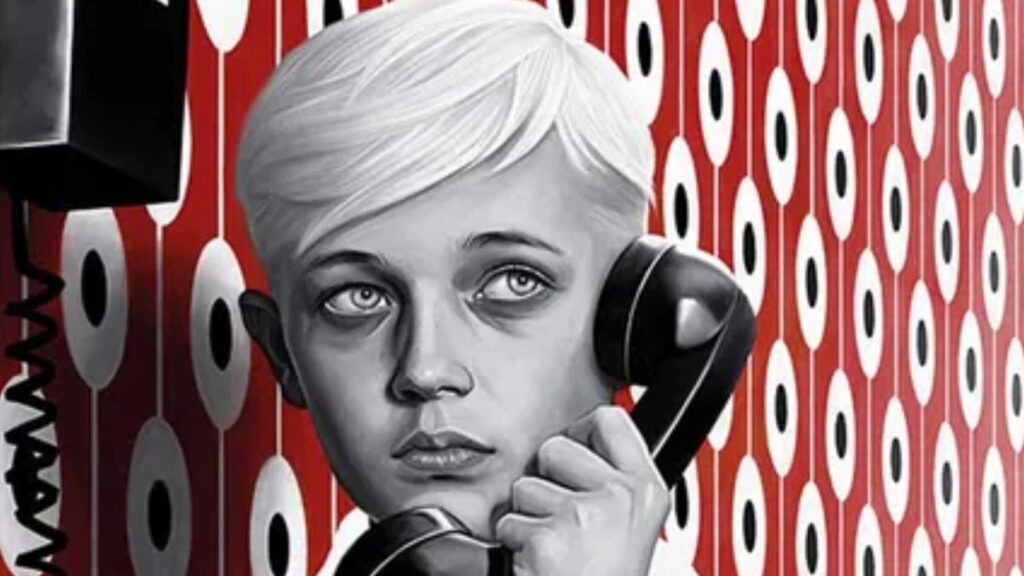One of Robert Carter’s illustrations for the Folio Society’s deluxe edition of ‘Fatherland’
More than three decades after its initial publication, Fatherland — author Robert Harris’s first foray into the world of fiction and an astounding piece of speculative storytelling — remains as powerful as ever.
Thanks to the Folio Society, fans of the 1992 alternate history novel can relive the winding investigation undertaken by Kriminalpolizei investigator Xavier March like never before with a collectible hardback edition (now on sale), which boasts an introduction from Graham Hurley and seven original illustrations by Robert Carter.
“Robert Harris appeals to everything. He’s an absolute master storyteller,” says Folio Publishing Director Tom Walker. “He just has that facility for absolutely immersing himself in a culture, making you completely believe that it’s real, and then telling a thriller on top that.”
Nowhere is that skill more apparent than in Fatherland, which drops the reader into a terrifyingly plausible reality where Nazi Germany emerged victorious from World War II and realized the sickeningly oversized blueprint for Germania. For three decades, the Third Reich has enjoyed a simulacrum peace and prosperity, albeit against the backdrop of a frigid Cold War stalemate with the United States, which funds Soviet guerrillas in this world’s equivalent of Vietnam. All of that is about to come to an end with an impending visit from President Joseph P. Kennedy.
The Nazi regime welcomes this chance at détente and will do anything to ensure its success. Enter police investigator Xavier “Zavi” March to throw a wrench into the gears. He’s part of a dying breed, one of the last decent and independently-minded souls in a Kafkaesque system of pernicious conformity maintained by hypocritical opportunists and power-hungry lunatics, who rely on thuggish Gestapo murderers to do their dirty work. When the corpse of one Josef Bühler, an early proponent of the National Socialist movement, washes up on the shore of the Havel just days away from Hitler’s 75th birthday celebrations in April 1964, the stubbornly committed March teams up with American journalist Charlotte Maguire to pick away at the festering scab of the Führer’s thousand-year empire, ultimately solving the mystery of what happened to Europe’s population of Jews.
Front cover of The Folio Society edition of ‘Fatherland’
Rendered in red, white, and black — aka the three colors of the Nazis’ infamous swastika emblem — Carter’s illustrations conjure up the dark, Brutalist reflection of ‘60s-era pop art, making them the perfect accompaniment to both the story’s retro time period and fascist setting, where all outside influences — from magazines to jazz — are brutally sanitized to adhere to the Reich’s joyless and draconian standards. One could almost see them as being commissioned by Joseph Goebbels in-universe as a propagandist jab at the “degenerate” art of American artists like Andy Warhol.
The rare pops of dissident color throughout, provided by Charlotte’s blue raincoat and a yellow phone booth, remind us of what lies at stake: freedom and hope within and beyond the drab borders of the new German empire. “We thought his work was really amazing — almost garishly colorful and very bold, confident illustration,” Walker explains. “We were intrigued by what he could do with Fatherland.”
Robert Carter’s illustration of Xavier March and Charlotte Maguire in The Folio Society edition of … [+]
“In Fatherland, Harris the conjurer opened a whole new bag of narrative tricks,” writes Hurley in his introduction. And indeed, the book set a new standard for the alternate history genre. Its seamless marriage of fact and fiction, effortlessly wrapped around a slick neo-noir conspiracy thriller, follows in the footsteps of — and in many cases improves upon — Philip K. Dick’s seminal portrait of a world subjugated by Axis rule, The Man in the High Castle, while simultaneously laying the groundwork for Michael Chabon’s The Yiddish Policemen’s Union and, more recently, Francis Spufford’s Cahokia Jazz.
Simply put, Harris’s masterful contribution to the literary store of parallel dimensions is one of the best what-if scenarios ever put to paper and had it come out just three years later, it would certainly be a shoe-in for the Sidewise Award (the highest honor given to those writers brave enough to glimpse into the multiverse and report what they see). The Folio Society edition gives Fatherland the respect it so richly deserves and in picking up a copy, which I ravenously devoured over the course of a single day (feverishly turning pages, despite my knowledge of the inevitable conclusion), I was reminded why it remains one of my favorite books in the world.
“Was history changed so easily?” March muses at one point in the story in what feels like a meta wink to the reader. If you’re Robert Harris, tweaks to the timeline are not only easy, but the impetus for one hell of a ride.
The Folio Society edition of Fatherland is now on sale here.
Read the full article here
